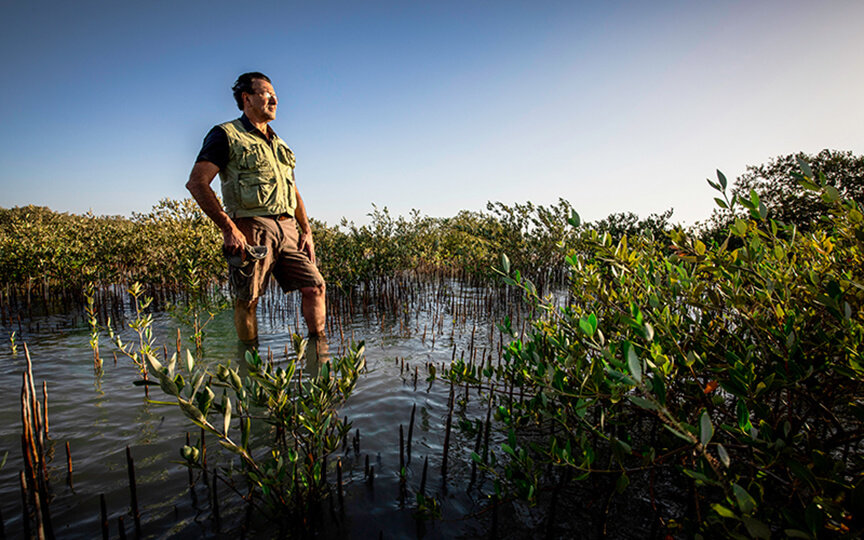RIYADH: As the host of UN negotiations on combating the loss of fertile land to deserts, Saudi Arabia’s climate envoy knows the Kingdom has more expertise on the subject than most.
“We have vast deserts in Saudi Arabia, so we know what it’s like,” Adel Al-Jubeir told Arab News during a special interview.
“We need to prevent the erosion of territory and the expansion of deserts. And we need to work on reclaiming land in order to have more for food production and in order to have more so that the negative impacts on climate get reduced.”
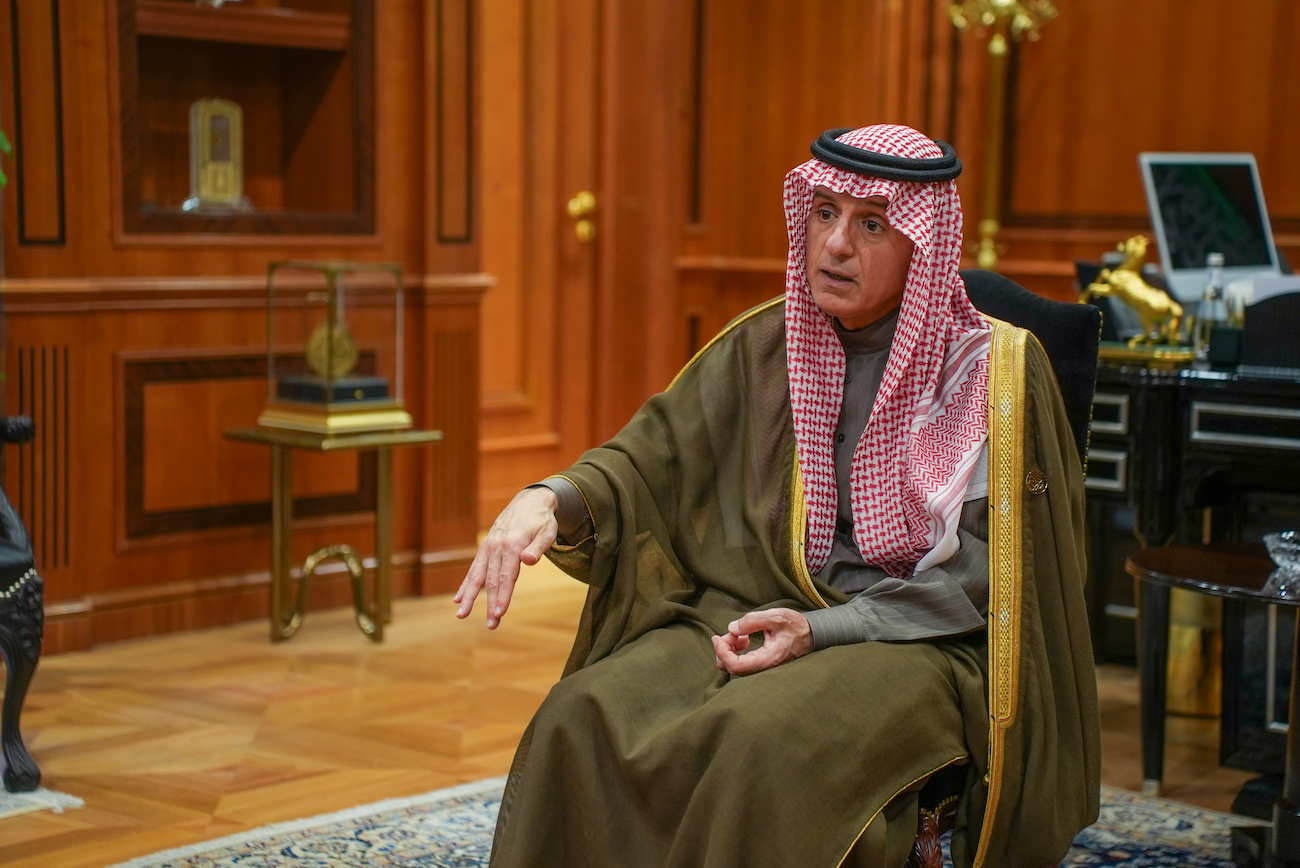
Saudi Climate Envoy Adel Al-Jubeir talks to Arab News’ Deputy Editor-in-Chief Noor Nugali. (AN photo)
Al-Jubeir, who is also minister of state for foreign affairs, was speaking as the Conference of the Parties of the UN Convention to Combat Desertification — known as COP16 — started in Riyadh on Tuesday.
The 12 days of talks will cover some of the most pressing challenges facing humanity, such as desertification, land degradation and drought.
Saudi Arabia is the first Arab country to host the event, the largest desertification COP since the first in 1997, and comes as momentum grows behind global frameworks to tackle the environmental challenges facing the planet.
In the wide-ranging conversation, Al-Jubeir discussed the aim of the COP16 talks, why land degradation is a global issue, and Saudi Arabia’s leadership role on the environment.
For Al-Jubeir, hosting COP16 carries particular significance given the Kingdom’s vulnerability to desertification, but also the work that has already been done to prevent it.
The approach in Saudi Arabia has been “very simple” and rooted in science and common sense, he said.
“When you disrupt an environment, it gets damaged. So, what you do is you preserve it. You designate territories to be protected areas,” he told Arab News.
“In 2015, for example, I believe less than 3 percent of Saudi territory was protected. Today, we’re almost at 18 or 19 percent, and we will be at 30 percent by 2030. This is a huge achievement.”
Rewilding, which forms part of the Saudi and Middle East Green Initiatives launched in 2021, has also generated huge benefits in terms of being able to reintroduce wildlife into these areas.
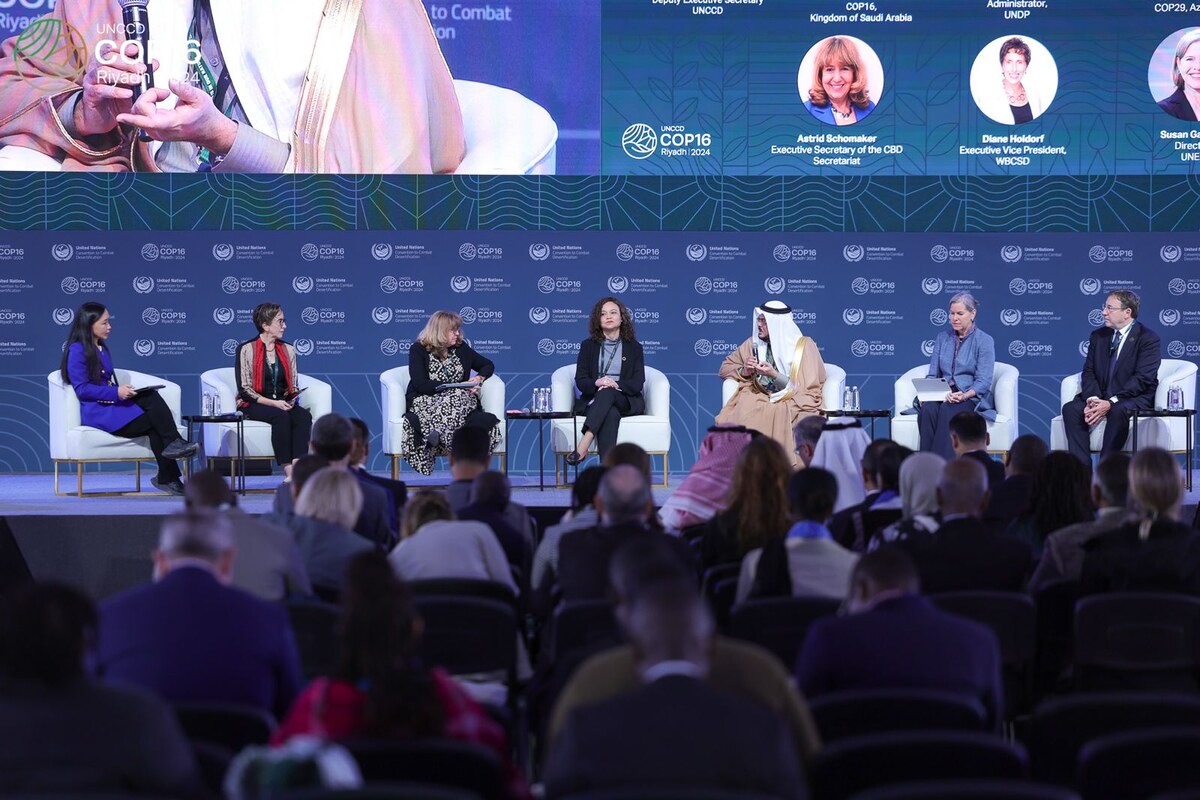
The UNCCD describes COP16 as a “critical milestone” in advancing global efforts to combat land degradation. (Supplied)
“You do it by introducing little shrubs,” said Al-Jubeir. “Insects come back, and then more plants, and then rodents come back, and then more plants, and you go up until you can introduce an animal like the Arabian leopard, and you restore it, or the oryx or the gazelle. And this is what we’re doing in Saudi Arabia.”
Al-Jubeir said this approach has led to noticeably fewer dust storms than seven or eight years ago, with less territory being disturbed and more areas being planted.
He said the Kingdom also tackled the issue by assessing the environmental impact of new developments, promoting sustainable farming techniques and ensuring cities were full of green spaces.
“On environmental issues, Saudi Arabia is a leader in global efforts to protect our environment, whether it’s climate, whether it’s oceans, whether it’s land,” Al-Jubeir said.
“Saudi Arabia has worked to bring the world together around a vision that basically says, very simply, we’re all in this together, we all benefit together, or we all suffer together.”
He said Saudi Arabia was bringing many more countries round to that point of view. “Our leadership is committed to this. The vision for 2030 came from our crown prince, and our crown prince was instrumental in launching the Saudi Green Initiative and the Middle East Green Initiative. He launched the Global Water Initiative, the hosting of COP16,” he said.
“Every initiative we are doing in Saudi Arabia has the direct blessing and support of our leadership, and it goes from the top leadership all the way to the citizen. The whole country is seized by this issue. And so I have no doubt that 10 years from now people will look at Saudi Arabia and they will say Saudi Arabia has played an instrumental role in leading the world toward a better place.”
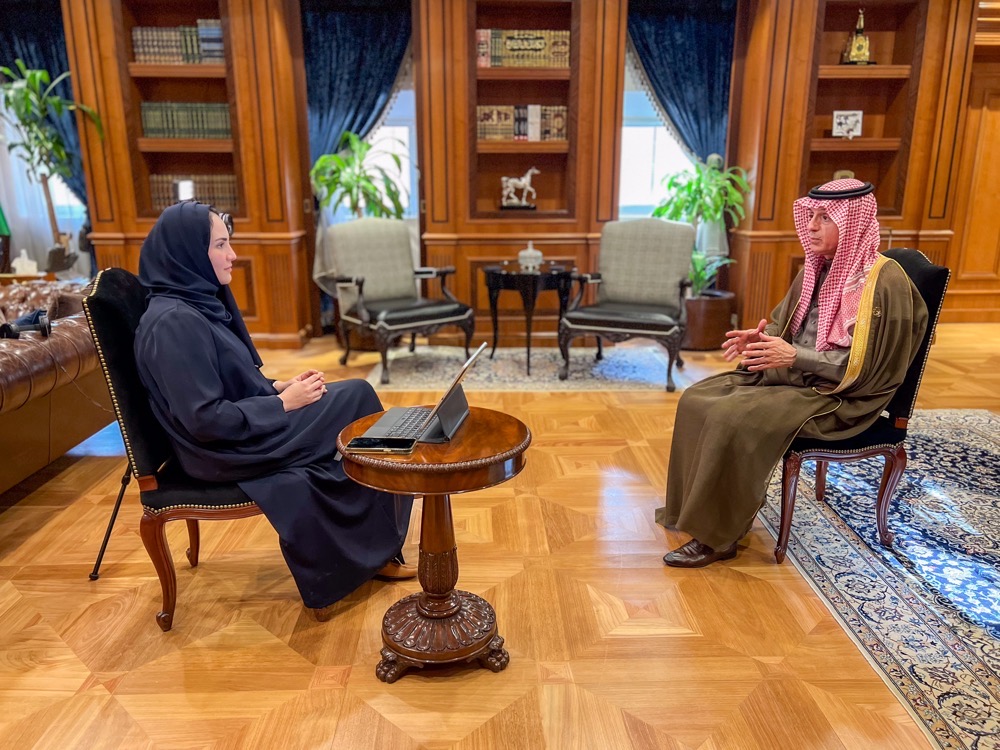
Adel Al-Jubeir spoke to Arab News Deputy Editor-in-Chief Noor Nugali as the COP16 summit kicked off in Riyadh on Tuesday. (AN photo)
The hosting of COP16 is about more than simply demonstrating how Saudi Arabia is rehabilitating land; it’s about elevating the importance of desertification on the global stage.
“We believe it impacts every human being on the planet,” Al-Jubeir said. “Land is a very important reservoir for carbon. And so, the less there is of it, the less carbon we can capture naturally.
“The earth is important for us in terms of food production. The less we have, the less food we produce, the more hunger and starvation we have. The more migration we have, the more conflict we have, the more extremism and terrorism we have, the more migration impacts political situations in countries in other parts of the world.
“So, it’s very, very important that it impacts all of our lives.”
The fact that COP16 is the biggest since 1997 represents the emergence of desertification as a global issue. Up to 40 percent of the world’s land is degraded, affecting half of all humans, according to UNCCD.
The consequences are getting worse for the climate, biodiversity and people’s livelihoods. Droughts are more frequent and severe, increasing by 29 percent since 2000 due to climate change and unsustainable land use.
If current trends continue, 1.5 billion hectares of land will need to be restored by 2030 to achieve a land-degradation neutrality.
The UNCCD describes COP16 as a “critical milestone” in advancing global efforts to combat land degradation, desertification and drought.
Under the title “Our Land. Our Future,” 196 countries and the EU have gathered in Riyadh to negotiate solutions, along with experts and civil society.
On Monday, the first day of the negotiations, Saudi Arabia announced the Riyadh Global Drought Resilience Partnership, an initiative to help 80 of the poorest countries cope with droughts. The partnership has secured $2.15 billion in funding pledges.
Also in Riyadh, Saudi Crown Prince and Prime Minister Mohammed bin Salman opened the One Water Summit on Tuesday. Attended by French President Emmanuel Macron and Kazakhstan’s President Kassym-Jomart Tokayev, the event aims to act as an “incubator for solutions” ahead of the next UN Water Conference.
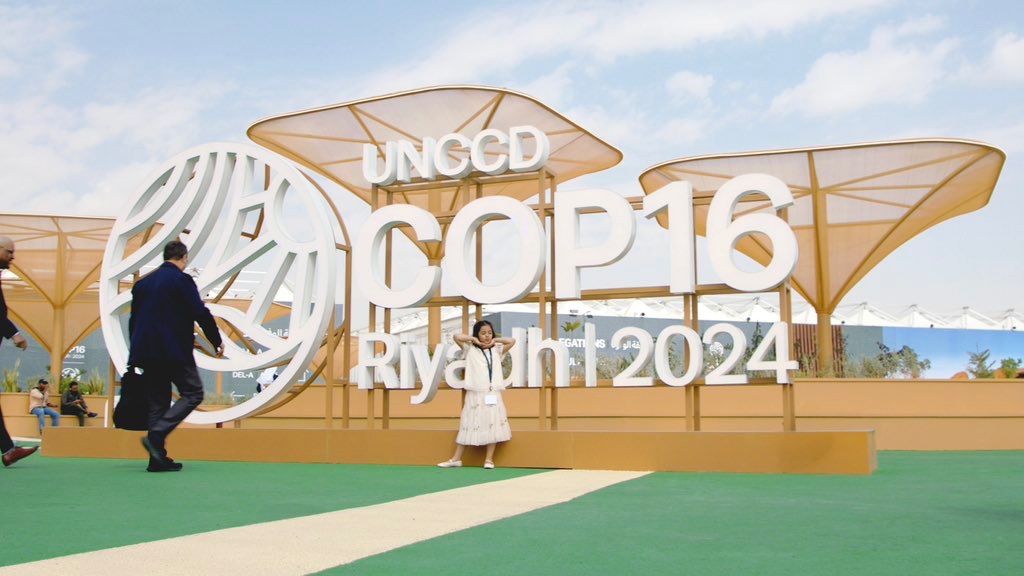
Saudi Arabia is hosting the COP16 summit to combat desertification. (Supplied)
“Water is the source of life,” Al-Jubeir said. “You can’t survive without it.”
The summit looks at how water can be used most efficiently and not wasted, he explained.
“These are issues where knowledge is important, science is important and sharing of methods and sharing of science are important,” he said.
It is this sharing of expertise that underpins Saudi Arabia’s approach to taking a lead globally on the major issues facing the planet.
Looking ahead, Al-Jubeir said: “We can either waste our time pointing fingers and trying to take political positions and grandstand, and try to appeal to lowest common denominators, or we can join together and practically, pragmatically, scientifically deal with the challenges that we’re facing, and we will overcome them together.
“Here’s the choice: Do we engage in theatrics and fight and get nowhere, or do we engage in serious work and get a handle around the problem? That’s where we’re heading, I believe, and I believe we’re heading there because Saudi Arabia is playing an increasingly big role in the global efforts to deal with those challenges.”
The hosting of COP16 and the One Water Summit is the latest example of Saudi Arabia being at the forefront of global efforts to tackle climate change and challenges to the environment.
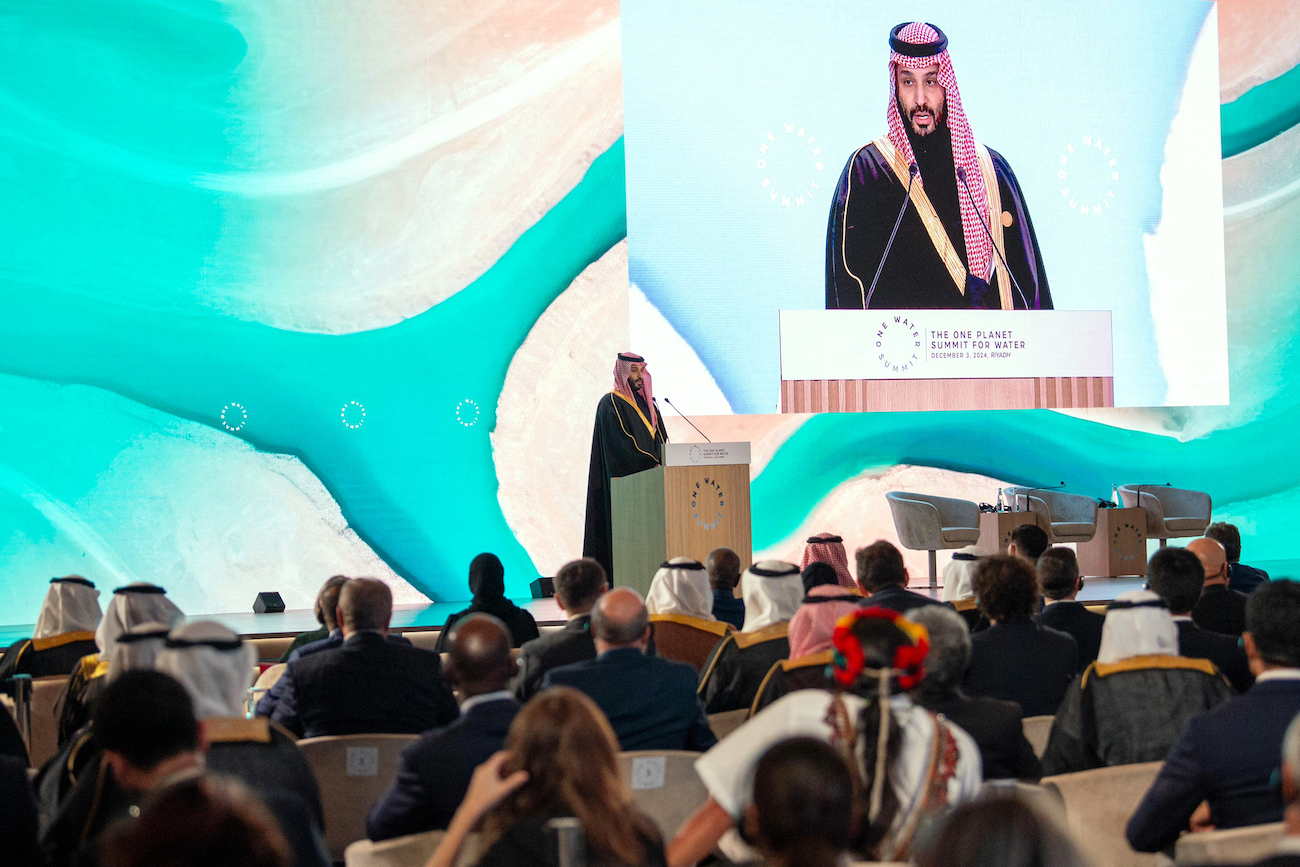
Saudi Crown Prince Mohammed bin Salman speaks during the One Water Summit in Riyadh on December 3, 2024. (AFP)
Al-Jubeir dismissed criticism that the country, as the world’s top crude oil exporter, is not suited for such a role.
“Saudi Arabia is the largest exporter of oil in the world, and we’re very proud of it,” he said. “We are providing the world with the energy that it needs in order to warm itself, in order to feed itself, in order to develop economically, in order to improve standards of living. And so that is one part.
“The other part of Saudi Arabia, as the largest oil producer/exporter in the world, is we are also one of the major proponents for protecting the environment, and for investing in new technologies and investing in renewable energy.
“Whether it’s solar, whether it’s hydro, whether it’s wind, whether it’s green and clean hydrogen, we are huge investors in this field because we believe that that’s where the future is. And so, there is no contradiction between the two.”
Taking the lead on green issues is also an approach popular with young people in Saudi Arabia, Al-Jubeir said, insisting the younger generations would be instrumental in halting desertification and creating a better living environment in the Kingdom overall.
“They want this issue to be dealt with effectively and efficiently, and they want to lead it,” he told Arab News. “And that’s what’s driving the enthusiasm among our young people toward dealing with desertification, dealing with supporting land restoration, reintroduction of wildlife, and then going beyond that into biodiversity, marine life, and into climate.”
Despite the many stark warnings about the effects of climate change, Al-Jubeir said the will of young people to tackle the issues, along with the direction from the country’s leaders, meant he was positive about how Saudi Arabia would appear in 10 years’ time.
“You will see that Saudi Arabia will be ahead of the world in terms of parks, in terms of fitness, in terms of land restoration, in terms of reintegration of animals into the wildlife, in terms of how pristine its beaches are, in terms of its corals, in terms of its mangroves, in terms of its agriculture, all across the board,” he said.
“We are determined, with courage, and with leadership, and with enthusiasm, to get there.”











